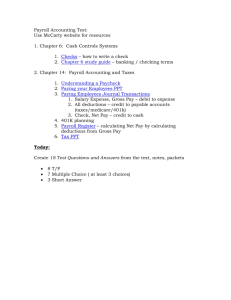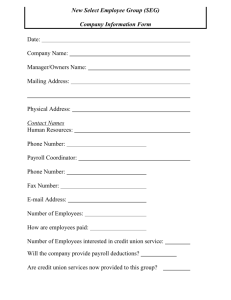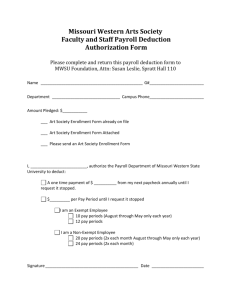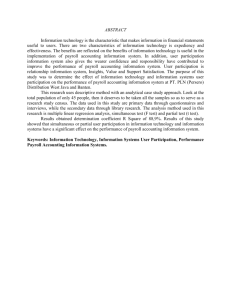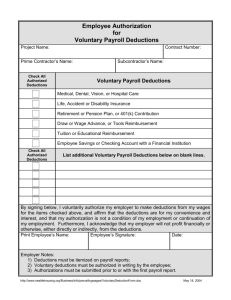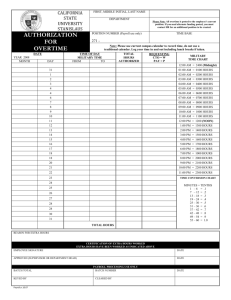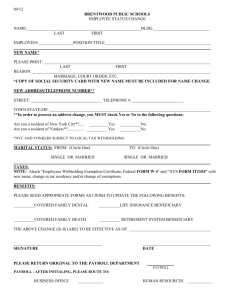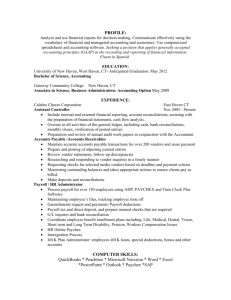Audit of Procedures for Payroll Deductions
advertisement
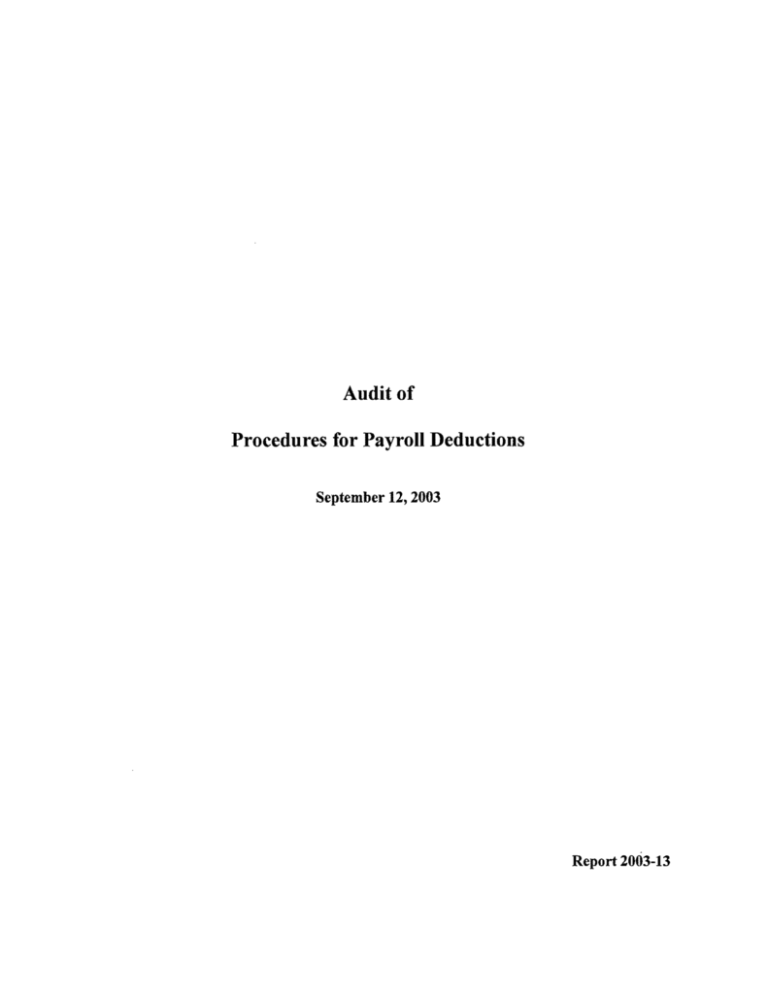
Audit of Procedures for Payroll Deductions September 12, 2003 Report 2003-13 MISSION STATEMENT The School Board of Palm Beach County is committed to excellence in education and preparation of all our students with the knowledge, skills, and ethics required for responsible citizenship and productive employment. Arthur C. Johnson, Ph.D. * Superintendent of Schools School Board Members Audit Committee Members Cindy Adair, Chair Tom Lynch, Chair William C. Graham Vice Chair* Richard Roberts, Vice Chair Georgette B. Carroll Paulette Burdick* Max Davis Monroe Benaim, M.D. Mark Hansen Kevin James Noah Silver Sandra Richmond JulieAnn Rico Allison* Debra Robinson, M.D. Shelley Vana* Thais Villanueva* *Ex-Officio Audit Committee Members Audit of Procedures for Payroll Deductions Table of Contents Page EXECUTIVE SUMMARY 1 PURPOSE AND AUTHORITY 3 SCOPE AND METHODOLOGY 3 BACKGROUND 4 CONCLUSIONS 1. A Retired Employee Received $2,546 in Duplicate Retirement Payment 2. Duplicate Deductions for Nine Employees' Paychecks 3. Controls for Garnishment Database Need Improvement 4. Employee Garnishment Calculations Not Automated 5. Federal Income Tax Withholding Discrepancies 6. Two Hundred Eighty Six Obsolete Deduction Codes Not Removed 7. Incorrect Employee Addresses in the Payroll System 8. Procedure Manual for Payroll Deductions Not Adequate 9. Excessive Access to Payroll Deduction Commands 10. Inadequate Control of the Insurance Premium Computation 4 5 6 6 7 8 8 9 10 10 APPENDICES - Management's Responses A. Department of Accounting Services B. Department of Employee Benefits and Risk Management 12 14 Audit of Procedures for Payroll Deductions Executive Summary Pursuant to the District's Audit Plan of2002-2003, we have audited the procedures for payroll deductions. The primary objectives ofthe audit were to determine the adequacy ofprocedures in (1) establishing and maintaining various payroll deductions and (2) adjusting employees' benefits due to changes in marital status, number of dependents, and employment status. The audit produced the following major conclusions: 1. A Retired Employee Received $2,546 In Duplicate Retirement Payment. Under the District's 1999 Early Retirement Plan, retirees are entitled to insurance subsidy reimbursement for up to ten years. Our review indicated that a retired employee received two insurance subsidy payments of $2,546.16 in 2002 instead of one payment, resulting in an overpayment of $2,546.16. Management's Response: Concur. 2. Duplicate Deductions For Nine Employees' Paychecks. Paychecks for nine employees had duplicate deductions during July 1, 2002, through January 31, 2003; six of the duplicate deductions occurred since February 2000. An estimated $665 was over-deducted from these employees' paychecks. Management's Response: Concur. 3. Controls For Garnishment Database Need Improvement. Accounting Services maintained a database for calculating and tracking garnishment deductions. The database was maintained on a PC instead of a server; it did not have a back up and had no restricted access. Management's Response: Concur. 4. Employee Garnishment Calculations Not Automated. Some garnishment deductions required manual processing including (a) deductions based on a percentage of an employee's salary, (b) child support garnishment deductions, and (c) deductions for part-time, temporary, and substitute employees. Payroll staff had to manually calculate and enter these deductions into the payroll system. In addition, no documentation was available to determine the procedure for these calculations. Management's Response: Concur. 5. Federal Income Tax Withholdings Discrepancies. Our review of federal income tax withholdings revealed that (a) one employee requested an additional $50 withholding per pay period was incorrectly entered into the payroll system as 50 1 exemptions and (b) one employee with 12 withholding allowance exemptions was not reported to the Internal Revenue Service (IRS) in accordance with IRS Publication 15 "Circular E, Employer's Tax Guide". Management's Response: Concur. 6. Two Hundred Eighty Six Obsolete Payroll Deduction Codes Not Removed. Obsolete payroll deduction codes were not removed/inactivated from the payroll system to avoid using incorrect/outdated deduction codes for payroll processing. As of January 31. 2003, 286 (55%) of the 518 deduction codes maintained in the payroll system were not used for over six months. Management's Response: Concur. 7. Incorrect Employee Addresses In The Payroll System. The District printed and mailed two sets of standardized forms, Florida Retirement System Choice Packet Plan Letters and 2002 Calendar Year W2 Tax Forms, to employees during 2002. Approximately 2,000 (five to ten percent) of each of these forms were returned to the District due to incorrect addresses in the payroll system. Management's Response: Concur. 8. Procedure Manual For Payroll Deductions Not Adequate. Payroll's and Employee Benefits & Risk Management's Procedure Manuals need improvement. The manuals did not include all required processes for payroll deductions. Management's Response: Concur. 9. Excessive Access to Payroll Deduction Commands. Eleven users were authorized to create new Payroll deduction codes. This number of users with such access appeared excessive. Management's Response: Concur. 10. Inadequate Control of the Insurance Premium Computation. The Benefits Unit of the Department of Employee Benefits & Risk Management computes the monthly health insurance premium payable to the insurance company, which averages over $7 million per month for all District employees. We noted that the Excel spreadsheets' formulas for the computation were not write-protected to prevent accidental changes. We also observed a minor error in the Excel formula for computing retirees' payments, although this error did not affect the total insurance premium due. In addition, one of the four databases used as input to the Excel computation, was not backed up for approximately two months. Management's Response: Concur. 2 THE SCHOOL DISTRICT OF PALM BEACH COUNTY, FLORIDA LUNG CHIU. CPA ARTHUR C. JOHNSON. Ph.D. DISTRICT AUDITOR SUPERINTENDENT OFFICE OF DISTRICTAUDITOR 3346 FOREST HILL BOULEVARD, SUITE B-302 WEST PALM BEACH. FL 33406 (561) 434-7335 FAX: (561) 434-8652 MEMORANDUM TO: Honorable Chair and Members of the School Board Arthur C. Johnson, Ph.D.,· Superintendent of Schools Chair and Members of Audit Committee FROM: Lung Chiu, CPA, District Auditor DATE: September 12,2003 SUBJECT: Audit of Procedures for Payroll Deductions l<L.t- PURPOSE AND AUTHORITY Pursuant to the District's Audit Plan 0/2002-2003, we have audited the District's procedures for payroll deductions. This audit also included the administration of employee benefits due to change in employment status. The primary objectives of the audit were to determine the adequacy of procedures in: • Establishing and maintaining: Voluntary payroll deductions, including medical and dental benefits. Mandatory payroll deductions, including federal withholding tax, Social Security (FICA) and Medicare taxes, and garnishments. • Adjustments for employees' benefits due to changes in marital status and number of dependents. This audit also determined if there were any duplicate payroll deductions, and if the deductions were appropriate. SCOPE AND METHODOLOGY The audit was performed byRandy Law, CISA, and Ellen Steinhoff, CISA, in accordance with Government Auditing Standards, during April through June 2003. This audit included: 3 AN EQUAL OPPORTUNITY EMPLOYER • Reviewing employee paycheck deduction records for the period of July 1,2002, through January 31, 2003. • Reviewing applicable School Board Policies. • Examining user documentation. • Reviewing the District's Medical Benefits Contracts for 2002 and 2003. • Verifying monthly medical insurance premium payments transmitted to the insurance company. • Interviewing staff of the following departments: Accounting Services Employee Benefits & Risk Management Information Technology Audit conclusions were brought to the attention of staff during the audit so that necessary corrective actions could be implemented immediately. The draft report was sent to the Departments of Accounting Services, Employee Benefits & Risk Management, and Information Technology for review and comments, and the responses are included in the Appendix. We would like to thank staff for their cooperation and the courtesy extended to us during the audit. The final draft report was presented to the Audit Committee at its September 12, 2003 meeting. BACKGROUND The Benefits Unit of Employee Benefits and Risk Management Department is responsible for initiating and maintaining voluntary payroll deductions such as medical, dental, and life insurance programs. The Payroll Section of the Accounting Services Department is responsible for establishing and administering mandatory deductions such as federal income tax withholding and FICA taxes, child support payments, and loan garnishments. All payroll deductions are processed by the Comprehensive Human Resources Information and Payroll System (CHIPS). CONCLUSIONS (A) Duplicate Payments and Deductions 1. A Retired Employee Received $2,546 in Duplicate Retirement Payment. In 1999, the District offered an early retirement program, which pays retirees an annual health insurance subsidy reimbursement for up to 10 years. The payment started at $2,400, increases 3% yearly, and is normally paid to participants each August. The audit revealed that a retired employee received two annual health insurance retirement payments of $2,546.16 each. This happened because a check issued to an employee for retroactive pay mistakenly included the annual health insurance 4 payment of$2,546.16. Afterward, this employee received another insurance payment of $2,546.16. Total amount received by this employee in 2002 for health insurance reimbursements became $5,092.32, instead of $2,546.16. We informed Payroll of this overpayment during the audit. Staff is in the process of recouping the overpayment from the retired employee. To assist staff in detecting and preventing future duplicate payments, a periodic Exception Report of Duplicate Payments should be developed and utilized by staff. Management's Response: Accounting Services: We concur. We sent a letter to the employee on June 24, 2003. He agreed that Payroll would deduct the $2, 546from his August 2003 NB99A insurance payment. Also, IT completed the payroll request for system modifications to display an online warning ofa duplicate payment entry (DPR 2002-0150). (Please see page 12.) 2. Duplicate Deductions For Nine Employees' Paychecks. Paychecks for nine employees had duplicate deductions during July 1,2002, through January 31, 2003. Our further review indicated that the duplicate deductions for six of them occurred since February 2000. An estimated $665 was over-deducted from these employees' paychecks. The causes of over-deduction were: • Staff input the new Future Teacher Scholarship Program payroll deduction information into the CHIPS computer system based on the annual payroll deduction forms submitted by employees. However, the old deduction records were not deleted from the CHIPS system. Subsequently, both the new and old deductions occurred for each pay period. • Payroll deduction records for employees who left the District were not removed accordingly. When some of these employees were subsequently rehired, new deduction records were established in the CHIPS system. However, the CHIPS system also reactivated the old payroll deductions from prior employment, resulting in duplicate deductions for these employees. Upon our inquiry, Payroll requested Information Technology to identify all employees who had two or more of the same type (duplicate) scheduled deductions. Information Technology created a report of all employees with possible duplicate scheduled deductions. Payroll Section reviewed the list and was making plans to take corrective action for these employees' deductions. In addition, Payroll submitted a request to modify the CHIPS system so that an employee's deductions will be removed automatically 30 days after termination. Risk Management will also provide input for this system modification. 5 Management's Response: Accounting Services: We concur. We will continue to work with the IT and Risk Management Departments to provide the joint solution. The completion date will be determined once the requested solution is identified. (Please see page 12.) Risk Management: We concur. We would prefer the benefit deduction be cancelled with the effective date ofcancellation input. This allows history and modifications if necessary. (For example, if an employee requests the payout ofsick leave more than 30 days after termination, any deductions that were not paid during employment are taken from the final payout.) (Please see page 14.) (B) Garnishments The School District maintains a garnishment database system to track and calculate mandatory deductions such as payments for student loans, child support, bankruptcies, and others. This database will help ensure that (1) employees have sufficient funds in their paychecks to cover mandatory deductions, and (2) employee's earnings are not used entirely to pay for garnishments. A total of$83,530 for 501 garnishment payroll deductions were processed by CHIPS for the January 31, 2003, pay period. Our review disclosed certain weaknesses in the garnishment database system. 3. Controls for Garnishment Database Need Improvement. The database used to calculate and track garnishment deductions was located on a personal computer in Accounting Services. The database was not on a server, did not have a back up, and had no restricted access. Unauthorized users could easily access, modify, and corrupt this confidential data. We informed the Payroll Section about this weakness, and recommended that the garnishment database be moved to the server where regular backups are done automatically, and the data is restricted to authorized users. Payroll agreed to take corrective action immediately. Management's Response: Accounting Services: We concur. The Database has been moved to the server and is password protected. Presently only three Payroll employees have access in order to assure business continuity. (Please see page 12.) 4. Employee Garnishment Calculations Not Automated. The following payroll transactions are processed manually by Payroll Section: 6 • Some garnishment calculations, such as student loans, etc, are based on a percentage of an employee's salary. Because the payroll system does not automatically adjust employee garnishment deductions along with their pay increases, Payroll staff manually re-calculates the new deduction amounts and enters the new information into CHIPS. • Excel spreadsheets are used to manually track and adjust garnishment deductions and balances for part-time, temporary, and substitute employees, and child support garnishment deductions for all employees. The deductions from the above calculations are manually entered into CHIPS. However, no documentation was available to determine the procedure for this calculation. The deductions should be automated in order to avoid potential miscalculation and human error. Management's Response: Accounting Services: We concur. Court decisions and statutory dispositions make it complicated to fully automate some garnishment calculations. Payroll will work with the IT Division to address the CHIPS system enhancement for automating the garnishment process. The completion date will be determined once the requested solution is finalized (Please see page 12.) (D) TaxDeductions 5. Federal Income Tax Withholdings Discrepancies. According to Internal Revenue Service (IRS) Publication 15 "Circular E, Employer's Tax Guide", the District is required to send a copy of employees' W4 forms (Employee's Withholding Allowance Certificate) to the IRS for those who claim more than ten withholding allowances. A review of employees with more than 10 withholding allowances revealed that: • One employee requested an additional $50 withholding per pay period; however, Payroll entered 50 exemptions for this employee. • One employee with 12 withholding allowance exemptions was not reported to the IRS. To detect withholding allowance input errors, Payroll should request Information Technology to produce these exception reports: • Daily updates of employees' W4 federal tax withholding amounts, allowances, and tax-exemption records. This report should be used to verify the accuracy of update to employees' tax information. 7 • A quarterly report with employees who claim more than 10 withholding allowances. Management's Response: Accounting Services: We concur. The situation was an input error and was corrected ITfurnishes the described reports to the Payroll Department upon request. We have already used the reports to verify the accuracy ofthe employees' tax deductions. (Please see page 12.) (D) Miscellaneous 6. Two Hundred Eighty Six Obsolete Deduction Codes Not Removed. Our review found that the CHIPS Payroll system has 518 active deduction codes as of January 28,2003. However, only 232 (45%) of them were being used during July 1,2002, through January 31,2003. The remaining 286 (55%) were not used during the same period. To avoid using incorrect/outdated deduction codes for payroll processing, obsolete deduction codes should be removed/inactivated from the CHIPS system. Management's Response: Accounting Services: We concur. We are working on a DPR to identify deduction codes not in use. IT will implement the inactivation on the deduction code screen to prevent accidental use ofold codes. Estimated completion date is October 31, 2003. (Please see page 13.) Risk Management: We concur. The CHIPS team is currently working on identifying the deduction codes that are obsolete. We have determined that we will inactivate some codes in order to recall them for historical purposes (i. e. worker's comp, court subpoenas, records). (Please see page 14.) 7. Incorrect Employee Addresses in the Payroll System. Two sets of forms were printed from the Payroll System, and were mailed to employees during 2002: • FRS (Florida Retirement System) Choice Packet Plan Letters • 2002 Calendar Year W2 Tax Forms Approximately 2,000 (five to ten percent) of each of these forms were returned to the District due to incorrect addresses in the CHIPS payroll system. The FRS packets were for permanent employees. Most of these 2,000 employees finally received their FRS packet, along with a change of address form, after Employee Records and Information Services Department researched each employee's 8 work location and sent the packet via interoffice mail to the employee's school prior to the end of 2002. The majority ofthe 2,000 W2's returned to the District were for temporary and substitute employees with incorrect addresses in the CHIPS system. These W2 forms are retained in Accounting Services until employees inquire about the forms. Some of these employees are no longer with the District. The School District should periodically verify the addresses of current employees. Management's Response: Accounting Services: We concur. We have discussed with IT a request to allow school secretaries the ability to update employees' addresses. We have been informed that IT is also working with Risk Management to include the update ofemployee addresses as part ofthe annual employee benefits open enrollment process. We estimate the process will be completed by October 1, 2003. (Please see page 13.) Risk Management: We concur. The Benefits area can assist in the following ways: • Materials sent to employees encourage employees to change their address with Employee Records; employees are directed to the website for Employee Records (short-term claims, CIS, Beneficiary change requests, FSA requests). • Carriers direct employees to the District for address changes. • We will be utilizing the Annual Enrollment as an event to update employee records for addresses and have made changes to the file format that is exchanged withFBMC. • We address this issue at New Employee Orientation. (Please see page 14.) 8. Procedure Manual for Deductions Not Adequate. Payroll's and Employee Benefits & Risk Management's Procedure Manuals for payroll deductions need improvement. The audit disclosed that procedures for the following activities were not documented: • Manual calculation of monthly insurance premium payment (estimated total monthly payment of over $7 million). • Establishing voluntary payroll deductions (medical, dental and vision) for new employees. • Establishing mandatory payroll deductions (tax levy, child support, and loan payments) for new employees. • Changing payroll deductions due to employees' change in marital status or the number of dependents for health insurance coverage and tax withholding. • Calculating and tracking garnishment payroll deductions. 9 Comprehensive and up-to-date procedure manuals should enable staff to effectively administer the District's payroll deduction transactions and comply with all related rules and regulations. The procedure manual should (1) cover procedures for all essential processes, and (2) be constantly updated to reflect current requirements. To ensure smooth operations in case of personnel turnover, employees should be cross-trained in handling different payroll deductions procedures. Payroll agreed to provide employees' cross-training programs. Management's Response: Accounting Services: We concur. We are updating our written procedures regarding the input ofemployees' deductions information. Also, we are evaluating which ofthe other deductions can be automated and will prepare a DPRfor the IT Division to modifY the programs as required to provide a temporary solution. (Please see page 13.) Risk Management: We concur. We are now updating our procedure manual for these activities. (Please see page 15.) 9. Excessive Access to Payroll Deduction Commands. A total of 11 users had access to create new Payroll deduction codes. Having 11 users with this access appeared excessive. Similar conclusions were also identified in our November 15, 2002, Audit ofComprehensive Human Resources Information and Payroll System (CHIPS) (Report #2002-14). In response, staff initiated corrective actions to address the issues. Management's Response: Accounting Services: We concur. The number ofemployees from ITpersonnel with access to the system has been reduced. The Payroll Department's personnel access to the system is limited to that needed to perform their functions. We have been informed that the Centralized Information Processing (CIP) staffdoes not have access to individual employee records. Key CIP application's staffmaintains on-line tables. This on-line table modification process replaced the batch program process or internal code for system controls (example: Employee Calendar). As this access is neededfor system efficiency and by user request, we are in compliance with the statement "Access to the system should be restricted to individuals on an as-needed basis". (Please see page 13.) 1O. Inadequate Control of the Insurance Premium Computation. The Benefits Unit of the Department of Employee Benefits and Risk Management computes the monthly health insurance premium payable to the insurance company, which 10 averages over $7 million per month. The computation process requires five person­ workdays per month. Staff collects the raw information from four different computer systems including CHIPS for active employees, AS for Leave of Absence, Travis Systems' RBILL for retirees, and Travis Systems' COBRA for ex-employees under COBRA arrangement. The information is then input into a number of Excel spreadsheets in order to complete the computation of the insurance premium due. We noted that the computation formulas of Excel spreadsheets were not write­ protected from accidental changes. In addition, we also noted a minor error in the Excel formula for computing retirees' payments, although this error did not affect the total insurance premium due. All the Excel formulas for the premium computation should be write-protected to (1) ensure the accuracy ofthe payments to the insurance company, and (2) prevent inadvertent changes to these formulas during processing. Additionally, no back up was performed for the RBILL database from May 10, 2003 to July 10, 2003. Upon our request, the department performed a back up of the database on July 14,2003. To minimize interruption to the administration of retirees' benefits due to system failure, periodic database back up should be performed. Management's Response: Risk Management: We concur.. Write protection ofthe spreadsheets should be completed by the 10th ofAugust, before the next computation ofpremium occurs. We will be using the format provided to us by the auditor. We were unable to back up the data with our system due to its size. IT recommends purchasing a larger computer with 2 drives. Backup process now takes 3.5 hours and is now on a regular schedule. (Please see page 15.) - End of Report 11 Appendix A Management's Response Department ofAccounting Services lHESCHOOLDlSTRICT OF ARTHUR C.JOHNSON. Ph.D PAlM BEACH COUNTY. FLORIDA Superin!endeot ACCOUNTlNG SERVICES 3366 Forest Hill Boulevard. A·323 West Palm Beach. Florida 33406-5870 (561) 434-8096 FAX.: (561) 434-8569 August 15, 2003 DISTRICT AUDITOR TO: Lung Chiu District Auditor FROM: Martin V. Arroyo Director ofAccounting SUBJECT: Responses for the Audit of Procedures for Payroll Deductions and Administration of , Employee Benefits Our response to the Audit of Procedures for Payroll Deductions and Administration of Employee Benefits, by item, follows: (A) Duplicate Payments and Deductions 1. A Retired Employee Received $2,546 in Duplicate Retirement Payment . Accounting Services concurs. We sent a letter to the employee on June 24, 2003. He agreed that Payroll would deduct the $2,546 from his August 2003 NB99A insurance payment. Also, IT completed the payroll request for system modifications to disp.1ay l!,n online warning of a duplicate payment entry (DPR 2002-0 ISO). • 2. Duplicate Deductions for Nine Employees' Paychecks. Accounting Services concurs. We will continue to work with the IT and Risk Management Departments to provide the joint solution. The completion date will be determined once the requested solution is identified. (8) Garnishments 3. Inadequate Controls for Garnishment Database. . . . Accounting Services concurs. The Database has been moved to the server and is password protected. Presently only three Payroll employees have access in order to assure business continuity. 4. Employee Garnishment Calculations Not Automated. Accounting Services concurs. Court decisions and statutory dispositions make it complicated to fully automate some garnishments calculations. Payroll will work with the IT Division to address the CHIPS system enhancement for automating the garnishment process. The completion date will be determined once the requested solution is finalized. (C) Tax Deductions ... S. Federal Tax Withholdings Discrepancies. Accounting Services concurs. The situation was an input error and was corrected. IT furnishes the described reports to the Payroll Department upon request. We have already used ' . the reports to verify the accuracy of the employees' tax deductions. AN EQUAl OPPORTUNllY EMPLOYER 12 Appendix A Management's Response Department ofAccounting Services (D) Miscellaneous 6.. Two Hundred Ei h Six Obsolete Deduction Codes Not Removed. Accounting Services concurs. We are working on a DPR to identl deduction codes not in use. IT will implement the inactivation on the deduction code screen to prevent accidental use of old codes. Estimated completion date is October 31, 2003. 7. Incorrect Employee Addresses. Accounting Services concurs. We have discussed with IT a request to allow school secretaries the ability to update employees' addresses. We have been infonned that IT is also working with Risk Management to include the update of employee addresses as part of the annual employee benefits open enrollment process. We estimate the process will be completed by October 1,2003. 8. Procedure Manual for Deductions Not Adequate. Accounting Services concurs. We are updating our written procedures regarding the input of employees' deductions information. Also, we are evaluating which of the other deductions can be automated and will prepare a DPR for the IT Division to modifY the programs as required to provide a temporary solution. 9. Users with Access to Payroll Deduction Information Not Required for Their Job Functions.· . , Accounting Services concurs. The number of employees from IT personnel with access to the system has been reduced. The Payroll Department's personnel access to the system is limited , to that needed to perfonn their functions. We have been infonned that the Centralized Infonnation Processing (CIP) staff does not have access to individual employee records. Key CIP application's staff maintains on-line tables. This on-line table modification process replaced the batch program process or internal code for system controls (example: Employee Calendar). As this access IS needed for system efficiency and by user request, we are in compliance with the statement "Access to the system should be restricted to individuals on an as-needed basis". to. Inadequate Control of the Insurance Premium Computation. . We concur. In consultation with the Department of Employee Benefits and Risk Management we corroborated that write protection of the computation formulas on the spreadsheets was completed. Also, they are using the fonnat provided to them by the Auditor. They were unable to backup the data with their system due to the files Size. IT recommended the purchase of a larger computer with two drives. Backup takes 3.5 hours now and is perfonned on a regular schedule. We have identified the urgent need for an integrated payroll software, during our current Business Process/Systems Review. It is our intention to acquire an updated system, with functionality to automate the processes and practically eliminate the findings of this audit. cc: Joseph Moore, Chief Operating Officer Jim Sheehan, Chief Information Officer Dianne Howard, Director, Employee Benefits and Risk Management Richard Contartesi, Director, Centralized Information Processing 13 Appendix B Management's Response Department ofEmployee Benefits and Risk Management MEMORANDUM TO: Lung Chiu District AUdito~ ~ ~ DISTRICT AUDITOR FROM: Dianne Howar~ Director, Employee Benefits and Risk Management DATE: August 5, 2003 SUBJECT: Audit Responses Usted below are our responses to the DRAFT Report of the Audit of Procedures for Payroll Deductions and Administration of Employee Benefits. Page Three, last paragraph We would prefer the benefit deduction be cancelled with the effective date of cancellation input. This allows history and modifications if necessary. (For example, if an employee requests the payout of sick leave more than 30 days after termination, any deductions that were not paid during employment are taken from the final payout.) Page Five D(Misc) 6. The CHIPS team is currently working on identifying the deduction codes that are obsolete. We have determined that we will inactivate some codes in order to recall them for historical purposes (i.e. worker's comp, court subpoenas, records) 7. The Benefits area can assist in the following ways: a. Materials sent to employees encourage employees to change their address with Employee Records; employees are directed to the website for Employee Records (short term daims, aS r Beneficiary change requests, FSA requests). b. Carriers direct employees to the District for address changes. c. We will be utilizing the Annual Enrollment as an event to update employee records for addresses and have made changes to the file format that is exchanged with FBMC. . 14 Appendix B Management's Response Department ofEmployee Benefits and Risk Management d. We address this issue at New Employee Orientation. Page Six 8. Procedure Manuals w.e are now updating our procedure manual for these activities. Page Seven 10. Premium computation • Write protection of the spreadsheets should be completed by the 10th of August, before the next computation of premium occurs. We will be using the format provided to us by the auditor. • We were unable to back up the data with our system due to its size. IT recommends purchasing a larger computer with 2 drives. Back up process now takes 3.5 hours and is now on a regular schedule. Thank you. DLH:aa 15
